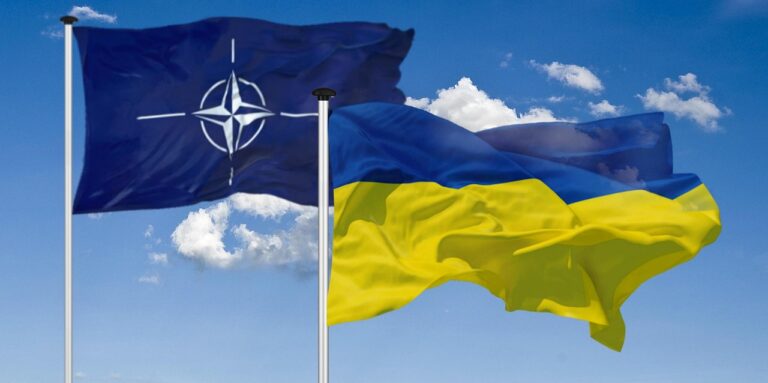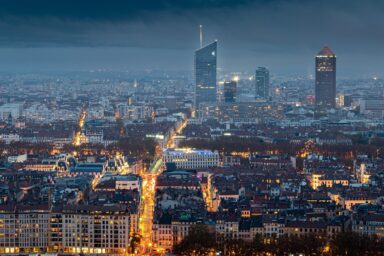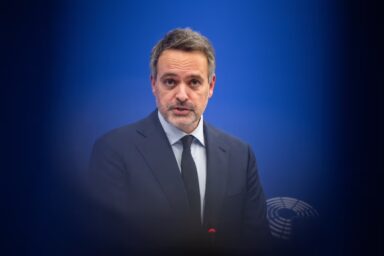If we do not help Ukraine further, we should all start learning Russian, Kaja Kallas, top diplomat of the EU, declared unequivocally at Wednesday’s plenary debate on the upcoming Nato summit. Not all MEPs agreed.
European Parliament’s plenary saw a charged debate on Wednesday, days ahead of the Nato summit in The Hague. The discussions focused on Russia’s escalating aggression, the urgent need for higher defence spending, and simmering tensions over Europe’s strategic autonomy.
Leaders of Nato countries will gather in the Netherlands on 24-26 June. They are to discuss how to ramp up defence spending in the context of Russia’s continued war of aggression against Ukraine. Calls from US President Donald Trump for European countries to take greater responsibility for their defence will provide another focal point.
A direct threat
Nato Secretary General Mark Rutte recently warned that Russia could be ready to use military force against the Western alliance within five years and said that Nato allies must have a credible defence. Ahead of the summit, he has urged Nato members to commit to spending five per cent of their national income on defence, a call that is expected to feature prominently in the summit deliberations.
European Commission Vice-President and the Union’s top diplomat Kaja Kallas opened the debate with a stark warning: “Russia is already a direct threat to the European Union,” citing hybrid attacks on infrastructure, military provocations, and a defence budget eclipsing the EU’s collective expenditure. “Russia spent more on defence last year than the EU combined,” she declared, framing Nato ’s proposed five per cent GDP spending target as a necessity rather than ambition. “Russia has a long-term plan for long-term aggression. You don’t spend that much on the military if you do not plan to use it.”
You might be interested
Russia has a long-term plan for long-term aggression. You don’t spend that much on the military if you do not plan to use it. Kaja Kallas, EC Vice-President
Ms Kallas outlined three priorities for the summit: ramping up defence investments, sustaining support for Ukraine, and preserving transatlantic unity. She highlighted the EU’s new SAFE instrument, a €150 billion loan scheme designed to finance joint procurement from European firms, as pivotal to unlocking €800 billion in defence investments over four years. “A stronger European Union is also a stronger Nato,” she asserted, noting that seven non-EU Nato allies, including the UK and Norway, had already signed defence partnerships with the continental bloc. On Ukraine, she warned against complacency: “If we don’t help Ukraine further, we should all start learning Russian,” echoing Mr Rutte.
A fractured vision
Nicolás Pascual de la Parte (PPE/ES) praised Nato’s historical success but urged adaptation. “The Indo-Pacific and Atlantic are interrelated,” he argued, advocating for a “global Nato” to counter threats beyond traditional theatres. He stressed burden-sharing with the US while prioritising capability gaps over raw spending figures: “It’s not only a matter of numbers. We must first decide what threats we face.”
His view found support in the fact that Presidents António Costa of the EU Council and Ursula von der Leyen of the EC met Prime Minister Anthony Albanese in Canada earlier on Wednesday. They agreed to start negotiations on a Security and Defence Partnership. It will provide a framework for current and future cooperation including in areas such as defence industry, cyber and counter-terrorism.
MEP Valérie Hayer (Renew/FRA) delivered a blistering critique of Europe’s “strategic naivety,” arguing that decades of underinvestment had left the bloc vulnerable. “Deterrence is peace,” she declared, quoting French philosopher Raymond Aron.
Ms Hayer then called for a “European military single market,” a nuclear deterrent underpinned by France’s arsenal, and a European Security Council to streamline defence decisions. “After three years of war, we must decide: what do Europeans do for their own security?” She dismissed incrementalism, urging the EU to “end taboos” and embrace “concrete measures” like a joint military academy.
The cost of defence: Who pays?
MEP Bas Eickhout (Greens-ALE/NE) acknowledged the need for higher spending but warned against fiscal recklessness. “Pouring money into a fragmented system won’t work,” he said, advocating for EU-wide procurement and a windfall tax on defence firms. “Taxpayers’ money cannot just line shareholders’ pockets.” He linked security to broader societal resilience: “People will support defence only if they have roofs and paid bills.”
MEP Marc Botenga (The Left/BEL) rejected the five per cent target outright, framing it as a betrayal of welfare states. “Five percent means €6k yearly per Belgian family. Who has that to spare?” He accused Nato of warmongering: “This isn’t defence—it’s preparation to attack Iran or China,” he offered an unorthodox view of European defence.
Others opted for a more realistic vision. MEP Michael Gahler (EPP/GER) struck a pragmatic tone, urging “common planning and procurement” to maximise efficiency. “We have a defence single market since 2011—let’s finally use it,” he said, criticising bureaucratic delays stifling SMEs. MEP Dan Barna (Renew/ROM) echoed calls for a “European pillar” within Nato, arguing that “a self-reliant Europe is the partner the US needs.” Both MEPs emphasised interoperability and industrial mobilisation, with Mr Barna warning: “The long peace was not luck—it was vigilance. Now, two per cent is dangerously low.”
Putinists and gangsters
No version of realist vision would please others, however. MEP Harald Vilimsky (PfE/AUT) lambasted the EU’s perceived militarisation. “The EU was founded to generate peace, not act as a military alliance,” he said, applauding Prime Ministers Robert Fico of Slovakia and Viktor Orbán of Hungary for resisting Nato’s “escalatory” demands. Mr Vilimsky dismissed Nato’s post-Cold War legacy as “dishonourable,” citing the 1999 Kosovo intervention and eastern expansion as catalysts for today’s tensions. “The EU must return to its original values: dialogue, not war,” he insisted.
The debate laid bare tensions over Europe’s role within Nato. Ms Kallas and centre-right MEPs framed transatlantic unity as existential, with Mr Gahler dismissing “putinists” in Hungary and Slovakia as outliers. Yet critics like Mr Vilimsky and Mr Botenga accused the bloc of surrendering sovereignty to US interests. Ms Hayer’s push for a “European nuclear umbrella” hinted at deeper ambitions for strategic independence, while Pascual de la Parte’s “global Nato” vision sought to align European and American priorities in countering China.
The long peace was not luck—it was vigilance. Now, two per cent is dangerously low. MEP Dan Barna
Mr Eickhout and Mr Botenga, meanwhile, warned of militarisation’s domestic costs. “Security means energy grids, hospitals, and cyber defences—not just tanks,” Mr Eickhout argued, reflecting his Green faction’s priorities. Mr Botenga’s fiery rhetoric—comparing Nato leadership to “gangsters”—underscored traditional leftist fears of austerity and imperial overreach. (Nobody asked the Belgian member what planet he inhabited.)
The Ukraine litmus test
Ukraine emerged as a litmus test for resolve. Ms Kallas touted the EU’s €50 billion in military aid and proposed 18th sanctions package as evidence of “strength Russia understands.” MEP Dan Barna Renew/ROM) framed Ukrainian victory as non-negotiable for European security, insisting: “A stronger Ukraine today means a stronger negotiating position tomorrow,” echoing Ms Hayer’s point. Messrs Vilimsky and Botenga, however, dismissed escalation as folly. “Sanctions hurt our people more than Russia’s elites,” Botenga claimed.
As the debate closed, Ms Kallas appealed for unity: “Europe’s will to act together is real. Tough times require tough resolve.” Yet divisions lingered. The centre-right and Renew Europe factions coalesced around higher spending and interoperability, while the Left and far-right rejected militarisation. Greens sought a middle ground, tying defence to social equity.
The summit’s stakes were crystallised in Ms Hayer’s challenge: “Will we remain dependent on US deterrence, or build our own?” For Nato, the answer may define its relevance in an era of multipolar threats. For the EU, it is a test of whether its 27 democracies can reconcile divergent histories and priorities into a coherent defence strategy—or risk fracturing under the weight of Putin’s aggression.











